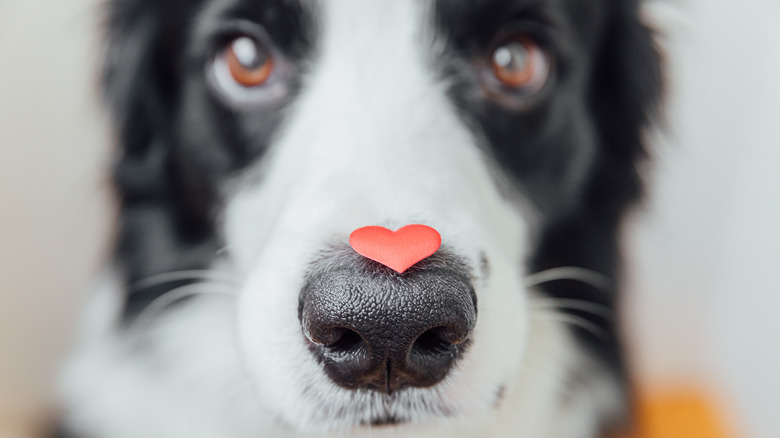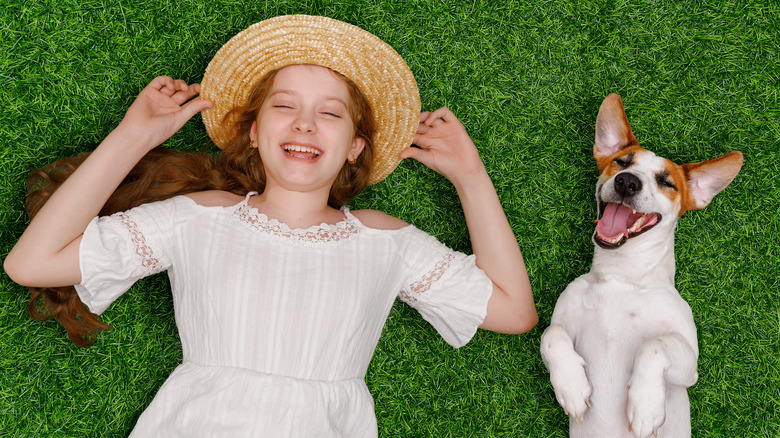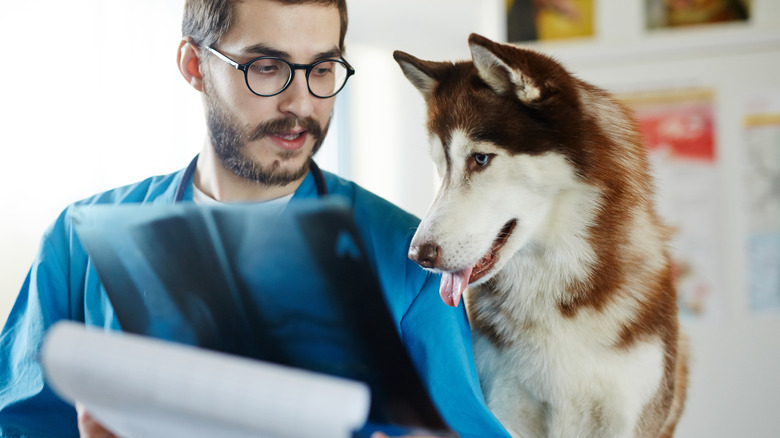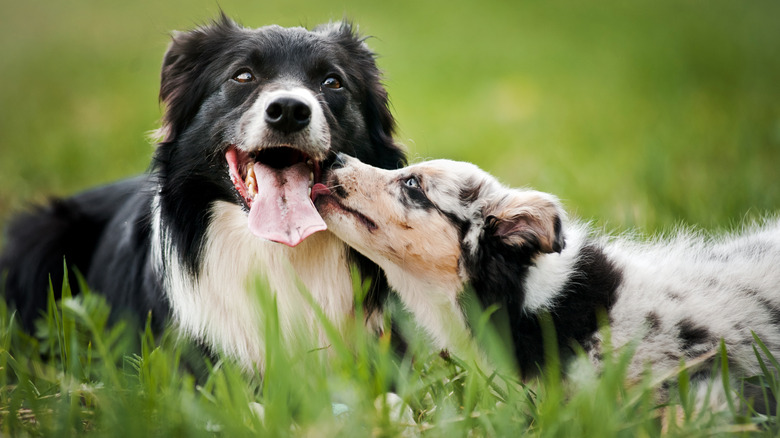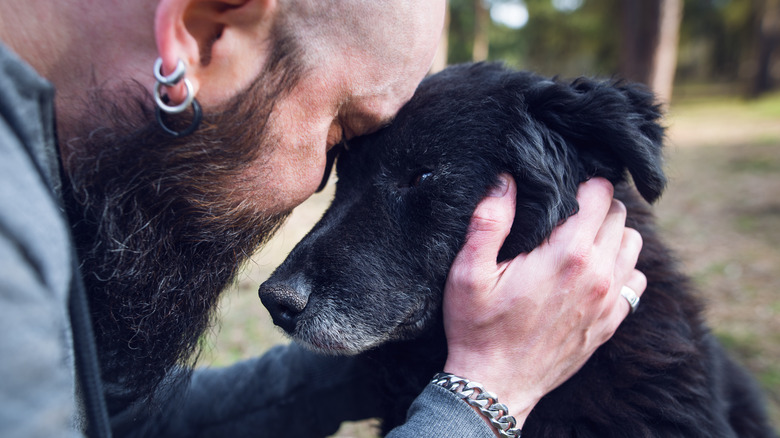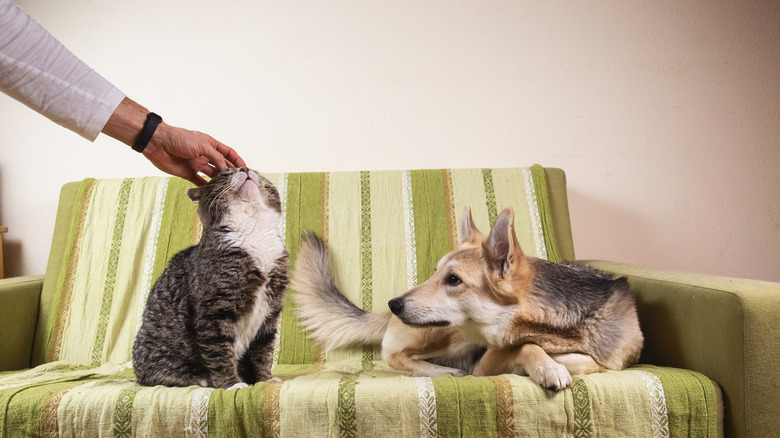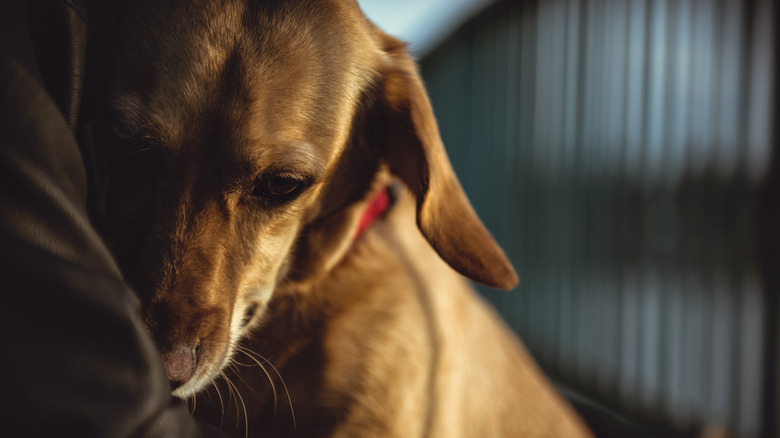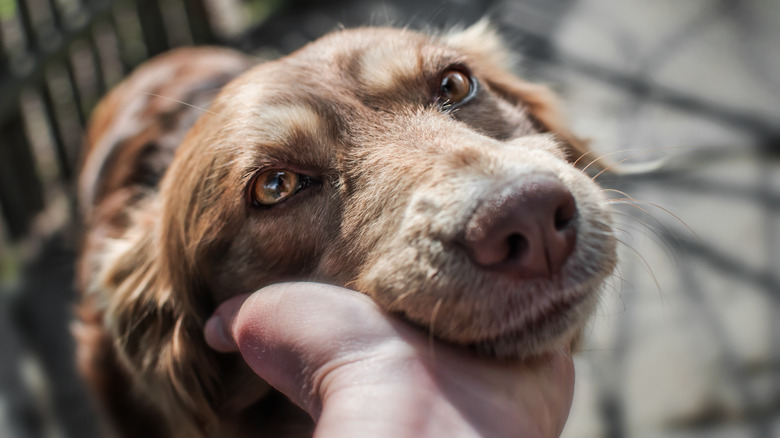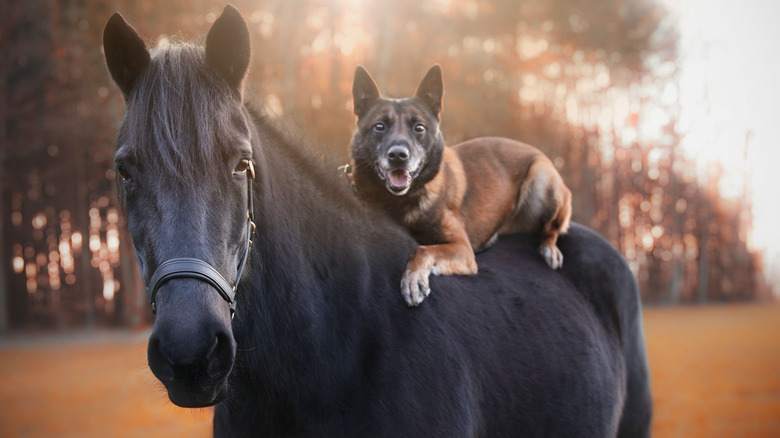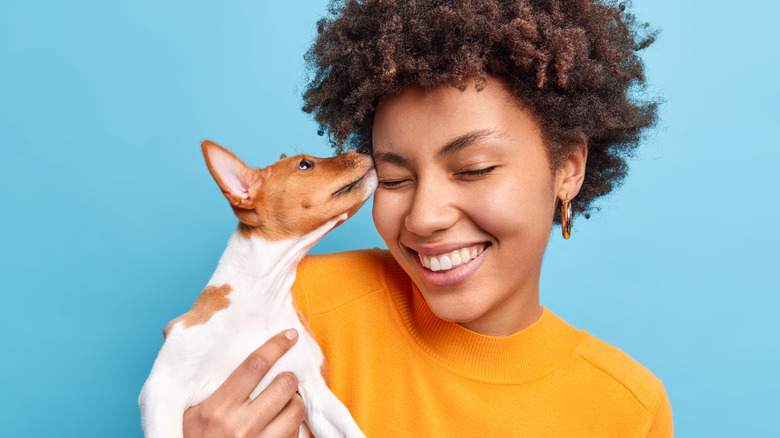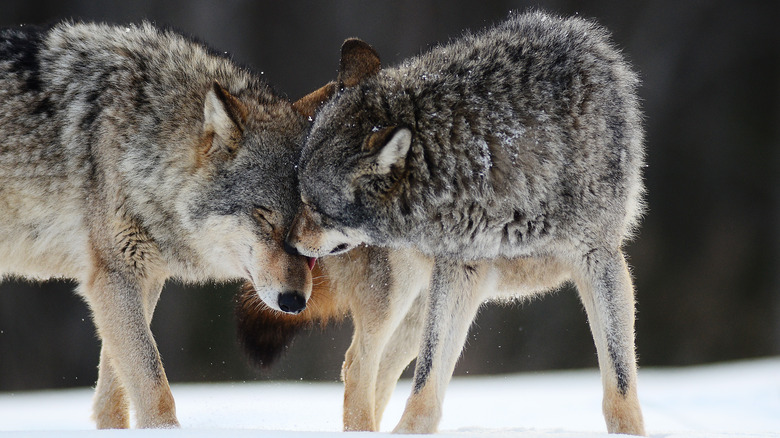What Scientists Believe About Dogs' Emotions
Ask anyone who has a faithful canine companion whether or not they have emotions and feelings, and the answer will be a super obvious, "Of course they do! How can you look into those deep, soulful eyes and think otherwise? Are you a monster?"
But here's the thing: We don't really know what's going on in our dogs' hearts and minds. Is it possible that we're just projecting human emotions onto them? It's possible, sure, but according to science, canine emotions are very real — and they're fascinating.
Barnard College actually has a Dog Cognition Lab, and while it's unclear whether or not the clever wordplay was intended, it's nice to think that it was. Head researcher Alexandra Horowitz has written extensively on canine emotions, and had an interesting take on things. She says that while it's important to acknowledge that yes, dogs have emotions, they're not precisely experienced in the same way as humans have feelings. But, that said, she added (via The New York Times): "For all we know, dogs' emotional experience is far more elaborate than ours."
While that's a beautiful thing for beloved pets with warm, cozy homes, it's also important to think of the strays, the abandoned, the homeless, and those waiting in shelters. They're a bundle of emotions, too, and that makes those ultra-depressing cases of animal cruelty somehow even worse. That said, let's take a deep dive into what science has been able to tell us about humankind's best friends.
Research has found concrete evidence of love
There's nothing quite like coming home to an excited pup who just wants to demonstrate how much he missed his favorite person in the whole wide world. Surely, that's love, right?
It is, and according to National Geographic, scientists know this because they've been able to demonstrate just what happens on a hormonal level when a dog and his owner look into each other's eyes.
The study cited was from Japan's Azabu University, and in a nutshell, researchers found that when a dog and his owner spent a decent amount of time playing or talking, it raised the levels of oxytocin in both individuals and created what they described as a chemical loop. The longer the pair interacted, the bigger boost they got to their oxytocin levels. Dogs' levels rose, encouraging social behavior, and the humans' levels rose, too, and reinforced interactive behavior on their part. So, what's oxytocin?
The Harvard Medical School calls it "the love hormone," and while the hormone's main function is to aid in childbirth and the bonding between a mother and child, it's also been linked to the flutter of happiness a person feels when they see someone they love – including, it turns out, our canine companions. Interestingly, experts say this makes a lot of sense, and dogs are basically tapping into mother-child bonding on a hormonal level, hijacking the system to bond with their owners in the same way a human child would. Clever pups!
How affectionate Mama Dog is impacts puppy fear and bravery
Puppies are pretty incredible: The whole world is new to them, and every experience is a first. Some greet new things head-on, while others are a little more on the shy side. (All puppies, however, are perfect.)
Puppies navigating new situations are running on a few emotions, including fear. Interestingly, researchers at Italy's University of Pisa have done some fascinating studies on what makes a puppy more or less fearful of new experiences, and a huge part of that comes down to their mother.
For this study, Psychology Today says the university's researchers recruited eight Beagle families. Lucky, lucky researchers documented how much time each mother spent doing things like cuddling with her puppies, licking them, and nursing them. The litters were monitored for 8.5 weeks, and then, each puppy was removed from the security of his or her family and placed in a fenced enclosure in a separate room. Puppies were left alone for three minutes and videotaped for signs of curiosity, distress, or anxiety.
It turned out that the more affectionate the mother had been, the more likely the puppy was to be confident in the face of this sudden and massive change. Another, similar experiment where puppies were handled by humans for just five minutes a day and starting at 3 days old also led to more confident, less fearful pups — a valuable piece of information for anyone who finds themselves with a litter of puppies.
A beagle, a border collie, and a basset walk into a bar...
Charles Darwin might be best known for throwing a monkey wrench into the whole Creationism thing, but he wasn't just interested in developing his theories of evolution. He also studied the similarities he saw between humans and animals, including emotions. His verdict? Psychology Today suggests he was the first scientist to recognize that dogs have a sense of humor.
While they might not be telling knock-knock jokes to each other, Darwin noted that humor was "a sort of emotional add-on to their games." He wrote of a dog playing fetch with her owner, and running away at the last possible second before the silly human could grab the stick — something he described as a dog's version of a practical joke.
But are they really feeling it when something is funny? Science actually says yes to this one, too. Researchers from Sierra Nevada College used a parabolic microphone to record the sounds dogs made as they played. They were particularly looking for a sound that had been previously described as being made through open jaws and stretched lips, sounding similar to a pant. What they found was that it wasn't panting at all: Playtime "laughter" had a wide range of frequencies indistinguishable to the human ear, while panting had a much narrower range.
Then, they recorded the "laughter" and played it for puppies, who broke into spontaneous playtime. Canine laughter, it turns out, is contagious.
Dogs have a part of the brain just for helping us
Can dogs get any more wonderful? Wholesome? Perfect? For anyone who's ever wondered why their canine BFF always seems to know when they're feeling a little blue and needing a pick-me-up, science has an answer — and it's incredible, says NPR.
Researchers from the MTA-ELTE Comparative Ethology Research Group in Budapest wanted to know how dogs were so good at picking up on their owners' emotions, so they trained 11 dogs — border collies and retrievers — to lie in an MRI machine while they listened to recordings of people and other dogs. What they found was that dogs have a region of the brain that becomes active when picking up on emotional cues in both the voices of humans and in the vocalizations of other dogs. The more positive the emotion, the stronger the reaction was from that part of the dog's brain.
This portion of the brain is strikingly similar to what's found in human brains, so much so that lead researcher Attila Andics explained to the BBC: "We think dogs and humans have a very similar mechanism to process emotional information. ... The fact that we found these areas exist at all in the dog brain at all is a surprise — it is the first time we have seen this in a non-primate."
Bottom line? Pupper knows when you need an extra cuddle because they know precisely what you're feeling.
MRI scans have revealed some fascinating things
Emory University neuroscientist Dr. Gregory Berns has done some incredible work studying the emotions of dogs. When he spoke to National Geographic about that work, he started by explaining why science has long scoffed at the idea of dogs and emotions. Humans have language and can name their feelings, so it seemed like it was a uniquely human experience. Berns proved otherwise.
Berns' team of dog volunteers were painstakingly trained to go into and lie in an MRI scanner. In addition to performing experiments to look at how, for example, dogs recognized the scents of their owners, they also exposed the dogs to stimuli meant to trigger a certain emotion.
The team has worked with dozens of dogs over the course of more than a decade. According to The New York Times, Berns says they came to the conclusion that dog brains are similar to human brains in the way they're laid out. That includes a part called the caudate nucleus, which is basically the pleasure center of the human brain. It's been found to be most active when a person is in a state of positive anticipation, and Berns found that it was the same for dogs. In much the same way that humans get a feel-good rush of dopamine for certain stimuli, dogs do, too. Other experiments suggested that for many, praise made them feel just as good as a treat.
Yes, dogs grieve, too
There's nothing that's straightforward about grief, and the loss of a beloved family member is devastating. It's devastating for dogs, too.
In 2022, researchers from the University of Milan published the results of a study done on canine grief. The Guardian says that owners were asked to fill out an extensive questionnaire on their dogs' behavior after the loss of another dog in the home, and results were telling. A full 86% of dogs demonstrated behaviors consistent with grief, including a loss of interest in food, sleep disruptions or more sleeping, and a lack of interest in toys, games, walks, and other activities. Factors like age and breed didn't matter. According to what veterinary behaviorist Dr. Nicholas Dodman told NBC News, some dogs are so deeply impacted by loss and grief that they require not just time, but "active intervention" — sometimes in the form of a new companion animal — to move on to a healthy lifestyle post-loss.
It's incredibly important for multi-dog households to keep all this in mind. Dodman explains, "This is a real phenomenon. ... This is something people should know."
Researchers say recent findings aren't entirely surprising: Not only are dogs pack animals, but their heightened senses can smell and remember a former companion dog long after humans have put away their toys and hung up their harnesses.
Think your dogs pick up your vibes? You're right
Dogs don't just have the capacity to feel many of the same kinds of emotions that humans do, but according to National Geographic, they're so in-tune to humans that our emotions can spread to them.
Arizona State University professor and head of the Canine Science Collaboratory Clive Wynne explains: "The emotional connection between humans and dogs is the essence of the relationship. Dogs are amazingly social beings, so they are easily infected with our warmth and joy."
Various studies have shown that it's not just happiness that can be contagious, but it's other emotions like fear and anger, too. And grief? Yes, even that. According to The Guardian, the University of Milan's study into canine grief found that the more a human grieved the loss of a dog in the household, the stronger the grief of surviving dogs was, and the greater the behavioral changes.
What exactly causes this? Research suggests that it's partially the strong emotional bond that many humans share with their dogs: The closer the pair and the more time they spend together, the more easily they'll share emotions. It's also partially rooted in dogs' ability to read faces and interpret human emotions that way — much like watching another person laugh is likely to make someone smile, a happy human means a happier pup. Studies have also shown that dogs can smell happiness or sadness in changes in body odor. Bottom line? Dogs are pretty amazing.
Sibling rivalry? It's not just imagination
Dog owners have all seen what they think might be jealousy, but is it? Yes. There are a few fascinating studies on canine jealousy, like one from the University of Vienna. They asked a group of 43 dogs to do tricks, and the dogs happily obliged even if they didn't get a treat or other reward. When they saw other dogs doing the same thing and getting a treat, though, they became less likely to listen and more stressed (via New Scientist).
Results of another study done at the University of Auckland were published by the Association for Psychological Science. According to Science Daily, the study found that dogs' jealous behaviors were triggered not just when they saw their owners interacting with a rival (in the form of a fake dog), but when their view of that rival was blocked by a divider. Seeing their owners interacting with another inanimate, less dog-like item didn't get the same response, suggesting that canine jealousy isn't just real, but is felt whether the owner's interaction with another dog is seen or not.
Those findings supported an earlier study, reported on by The New York Times. Psychologists from the University of California had owners either play with a realistic-looking stuffed dog, read from a book, or fuss over a pumpkin. Most of the dogs weren't bothered by the book or the pumpkin, but the dog? They made it perfectly clear that the stuffed dog needed to get away from their person, like... right now.
Science is painting a picture of canine PTSD
Dogs, says the BBC, are the animals humankind domesticated first, and they're our oldest friends. That friendship goes back at least 11,000 years, and that means humans and dogs have been through a lot together. Surprisingly, it was only in 2020 that professors from Texas A&M University's Veterinary Medicine & Biomedical Sciences school started working on decoding canine PTSD.
While there's a lot that's still unknown about it, Dr. Lori Teller says that anywhere from 5% to 17% of dogs will suffer from PTSD in their lifetimes, and it's not just dogs who have been the victims of abuse, or those who are exposed to stressful situations by their work in the military and law enforcement. PTSD could also develop in dogs who are born into or kept in puppy mills, used as bait or fighting dogs, endure natural disasters, or suffer an attack by a person or another dog.
Experts have described the symptoms that dogs suffering from PTSD might display, and they'll sound very familiar to anyone who has experience with the human form: It includes things like hypervigilance, avoidance, difficulty sleeping, and aggression. Dogs, Teller says, can be more adept at hiding symptoms, and in some cases, both behavior-based therapies and medications have been found successful in managing canine PTSD.
Teller says there's still a lot that needs to be learned.
Dogs can empathize with human suffering and sadness
Empathy is a complicated thing: More than an emotion, it's relating to the emotions of others. And dogs? They're champs.
In 2018, the results of a study on empathy and behavior in dogs were published in Learning & Behavior (via Science Daily). In the study, a group of dogs (both registered therapy dogs and pets) were separated from their owners by a door they could open. Owners were told to either hum or cry, and the dogs' responses were documented.
Some of the dogs who heard owners humming would open the doors to go to them, but more interesting were the responses of the dogs to their crying owners. Not only did the dogs tend to open the door much more quickly, but according to a study published in 2018, stress levels rose in the dogs who heard their owners crying — and that's key.
The lower stress levels of the dogs looking for their humming owners suggested they were simply curious about what was going on, or looking for them because that's just what dogs do. The high stress levels and faster response dogs gave to crying owners suggested that not only did they feel concern and a desire to help, but they were suppressing their own stress in order to come to their owners' aid. The fact that therapy dogs didn't do any better or worse than pets was telling, too, with researchers suggesting it's not a behavior that's taught, and instead comes with human-dog bonding.
Does Fido really feel bad about what they did?
Every dog owner knows this one: Fido does something bad, gets scolded for it, and looks adorably ashamed. But are they actually feeling something akin to the human version of guilt, shame, or remorse? The science is always subject to change, but right now, experts say that they don't.
Not exactly, but that's not to say they're not feeling anything at all. According to what veterinary scientist Dr. Susan Hazel told the ABC, that apparently shameful look is "appeasement-like behavior that some owners interpret as guilt."
According to Psychology Today, it's believed the sad eyes and the so-called guilty look doesn't come along with the dog feeling shame, and instead, they were feeling something more along the lines of fear. Studies — like ones conducted by Barnard College and Eotvos Lorand University — suggest that instead of having feelings relating to their own actions, dogs are actually feeling emotions triggered by the angry reactions of their humans.
The American Kennel Club agrees, citing scientific research rooted in the idea that a dog's outward demonstrations of stress and fear look to humans like guilt. They're feeling something — the need to appease the human they love, who's very, very mad at them — but they're not precisely shouldering the blame for that anger themselves. They're just trying to make you feel better, without feeling bad about being the ones that screwed up in the first place.
Separation anxiety is more complicated than anyone thought
When we leave dogs — even just for a little bit — some can suffer from what we call separation anxiety. It's well-known what they do, but what are they feeling?
Starting in 2014, the University of Lincoln started a study that involved 2,839 dogs. The findings were published in Frontiers in Veterinary Science, and they found "separation anxiety" wasn't a diagnosis, but a symptom of underlying problems and feelings.
They found four main things at the root of separation anxiety behavior. In one group, they traced the behavior back to feelings of panic and anxiety at being separated from their owner, and when going to find their person didn't work, their frustration came out in destructive behaviors. A second group was described as feeling much the same as the first — panic at being alone — but as also experiencing aggression.
A third group experienced the same social panic, but instead of having an escape instinct that pushed them to go find their owners, they took solace in the comfort of the familiar surroundings of the home. The fourth group was defined as suffering from extreme boredom when left alone, which then manifested into the typical destructive behavior associated with separation anxiety.
It's interesting work that turns the whole idea of separation anxiety upside-down: It's not something a dog has, it's something a dog does in response to what they're feeling when they're left alone — and that root cause is what needs to be addressed.
Humans aren't alone as the target of dogs' affections
Humans like to think that we're special in our relationship with our canine companions. Surely, it's a win-win relationship that dogs can only share with people, right?
Not so fast, says Arizona State University psychologist and dog behavior specialist Dr. Clive Wynne. He has a bit of a different take on why dogs and humans hit it off so well. Wynne told The New York Times that it's not about intelligence — it's about how dogs have what's described as "a unique capacity for interspecies love."
What does that mean? Essentially, he's found that dogs will form an emotional bond with anyone they're around. It's why they're so well-adjusted to living with humans, it's why they're such good protectors of livestock, why they can live comfortably with cats — long reputed to be their mortal enemies — and it's why they've done so well when it comes to domestication.
Wynne's work with dogs and other canines led him to the conclusion that it wasn't a matter of how smart they are, but friendliness. Puppies are easy to socialize when exposed to the right handling and care, a characteristic that isn't even shared with their close cousins, wolves. So, good news: They're with us because they honestly enjoy our company. Less good news? They can feel the same about any animal.
There may be a genetic reason for their friendliness
So, we know that dogs are innately friendly, but here's the interesting thing: Research published in Science Advances 2017 suggests there's actually a genetic component to a dog's in-your-face friendliness.
The study — which was conducted as a joint effort between several universities, including Princeton and Oregon State University — looked at the genetics of friendly dogs and wolves. There were two genes in particular that were isolated in dogs deemed to have "hypersociability," and the weird thing? Those genes are also found to present in a similar way in humans, particularly those humans diagnosed with something called Williams-Beuren syndrome.
That, says Inside Science, is a condition that is diagnosed in about 1 in every 10,000 people, and interestingly, one of the characteristics that's associated with it is a super-friendly, outgoing personality. (Unfortunately, it also comes with some less desirable traits in humans, like a susceptibility to heart defects.)
Researchers believe the variants seen in that particular set of genes directly impact the friendliness of an individual, even within dogs. When they looked at different breeds, those that had a reputation for being friendlier and more affectionate showed similar patterns in their variations. Dr. Clive Wynne suggests that this genetic mutation allowing for friendliness may have played a key part in domestication, encouraging dogs with a genetic predisposition for love to go and make some new friends.
What about wolves?
While dog owners have known for a long time just how deeply their canine companions can feel things like love, it's definitely nice to have some hard science backing that up. But that brings up an interesting question: What about wolves and other wild dogs?
In 2013, a joint study between Vienna's University of Veterinary Medicine and the Wolf Science Center examined stress hormones present in the saliva of howling wolves. The goal was to find out if they were howling because of stress, or if they were howling because they were missing a member of their pack. The verdict? They were howling out of love. According to ABC News, study author Friederike Range said they also discovered variations in the howls themselves, suggesting certain members of the pack had different emotional bonds which were reflected in their communication.
Marc Bekoff, author of "The Emotional Lives of Animals," spent years studying the animals. According to The Dodo, he came to the conclusion that yes, wolves even grieve. He observed a pack that had lost one wolf, and documented how howls changed and playfulness stopped, and how their body language changed when they returned to the place where she had been killed.
He sums up the beliefs his observations have led him to like this: "There's no doubt whatsoever that, when it comes to what we can and cannot do to other animals, it's their emotions that should inform our actions on their behalf, and we can always do more for them."
